- Home
- Carl Deuker
Payback Time
Payback Time Read online
Table of Contents
Title Page
Table of Contents
Epigraph
Copyright
Dedication
PART ONE
1
2
3
4
5
6
7
8
9
10
11
12
13
14
PART TWO
1
2
3
4
5
6
7
8
9
10
PART THREE
1
2
3
4
5
6
7
8
9
10
11
12
13
14
15
16
17
18
19
PART FOUR
1
2
3
4
5
6
7
8
9
10
11
12
PART FIVE
1
2
3
4
5
6
7
8
9
10
11
12
13
14
Epilogue
The author
would like to thank
Ann Rider, the editor of this
book, for her advice and
encouragement.
Copyright © 2010 by Carl Deuker
All rights reserved. For information about permission to reproduce selections from
this book, write to Permissions, Houghton Mifflin Harcourt Publishing Company,
215 Park Avenue South, New York, New York 10003.
Houghton Mifflin is an imprint of Houghton Mifflin Harcourt Publishing Company.
www.hmhbooks.com
The text of this book is set in Lino Letter.
Library of Congress Cataloging-in-Publication Data
Deuker, Carl.
Payback time / by Carl Deuker.
p. cm.
Summary: Overweight, somewhat timid Mitch reluctantly agrees to be the sports
reporter for the Lincoln High newspaper because he is determined to be a writer,
but he senses a real story in Angel, a talented football player who refuses to stand
out on the field—or to discuss his past.
ISBN 978-0-547-27981-7
[1. Reporters and reporting—Fiction. 2. Football—Fiction. 3. Overweight persons—
Fiction. 4. Courage—Fiction. 5. Secrets—Fiction. 6. High schools—Fiction.
7. Schools—Fiction.] I. Title.
PZ7.D493Pay 2010
[Fic]—dc22 2010006779
Manufactured in the United States of America
DOC 10 9 8 7 6 5 4 3 2 1
4500245396
For Anne and Marian
PART ONE
1
I'M GOING TO BE A FAMOUS REPORTER. My name—Daniel True—will be on the front page of the New York Times. A huge story is waiting for me, and I'll find it—no doubt about it.
Ah, who am I kidding?
There's lots of doubt about it. Nothing but doubt.
Still, a guy can dream, can't he?
When I was little, my dad took me to see All the President's Men at a theater that shows old movies. I didn't follow the politics about Nixon and Watergate, but as I watched I knew I was born to be a reporter. Meeting in gritty alleyways with strangers who tell you a little bit of this and a little bit of that, taking those little bits, digging deeper, asking questions, learning more until you've got a story that shakes the world—what could be more satisfying than that?
I want to live in New York City major in journalism at Columbia University, have my finger on the pulse of the world. But instead of being at a great college in an exciting city I'm stuck at mediocre Abraham Lincoln High School in boring Seattle.
For the past three years I've written articles for my school newspaper, but my classmates don't think of me as Daniel True, future prize-winning reporter. To them I'm not even Danny, which is what the kids called me in grade school; or Dan, which is what my mom and dad call me now. At Lincoln, I'm Mitch.
That doesn't sound like a bad nickname until you hear how I got it. I'm five four and I weigh 180. Okay 190. Okay 200 ... three months ago. I've got wispy blond hair and skin the color of copy paper. Girls don't chase me down the halls.
Three years ago, when I first walked through the double doors of Lincoln High, Stan Bach, a football player with a Dallas Cowboys star tattooed on his neck and a voice the size of Texas, spotted me in the lunch line. "Hey, look who's a Lincoln Mustang now," he said to his friends. "It's the Michelin Man." His football buddies roared as if he were funnier than the Three Stooges. Michelin Man! Michelin Man!
For a few weeks kids called me Michelin Man. That was shortened to Mitch Man, which got shortened to Mitch, which stuck. Now, most kids don't even know that my real name is Daniel. Sometimes even I forget.
Last year Ms. Bergstrom, my English teacher, kept me after class one day. "I heard how you got your nickname," she said as she roamed the room picking pencils off the floor, "and I know how much it must hurt your feelings. Always remember that Alexander Pope, one of the greatest writers of all time, was a dwarf with pockmarked skin and bad breath."
She was trying to be nice—but give me a break, lady. I'm not a zitty dwarf with halitosis. Still, after school that day I bought a large tube of Clearasil and a larger bottle of Listerine, both of which I use daily. I don't want to be "Stinky Mitch" or "Mitch the Zit."
2
LINCOLN HIGH WASN'T ALWAYS the most boring school in the world. For one incredible week, my corner of Seattle was the center of the media universe. CNN, CBS, ABC, Fox, MSNBC, the New York Times—you name it, and their correspondents were crawling all over Lincoln High.
It happened like this. Chance Taylor, a Lincoln senior with no mother and a drunk for a father, got involved with some Al Qaeda types who were smuggling plastic explosives into the United States from Canada. Homeland Security never found out what they were planning to destroy, but a bomb did blow up in Puget Sound, killing two terrorists and Chance's father.
The editor of the Lincoln Light that year was Melissa Watts, the daughter of a super-rich lawyer. Melissa also happened to be the semi-girlfriend of Chance Taylor. Not exactly a predictable couple: she ended up at some college like Yale, and Chance ended up in a Humvee in Iraq. But then, I'm no expert on why people hook up. Anyway, for months Melissa had suspected that Chance was involved in smuggling.
Imagine it: the editor of a high school newspaper, sitting on one of the biggest stories of the year. The hairs on the back of my neck stand up whenever I think about it. So, what does Melissa do? Does she
A) write up what she knows, send it to the New York Times, and transform herself into a famous journalist;
B) turn her boyfriend over to the FBI and become an instant talk-show celebrity, an American patriot with a broken heart, appearing Monday on Oprah; or
C) twiddle her thumbs?
If you guessed C, you win the washer/dryer and one year's supply of Tide.
So why didn't I step up when she backed off? A good question, and I've got a good answer. I was in middle school when this juicy stuff was going down. If an opportunity like that came my way now, I wouldn't let it slip away. Unfortunately sleep
y Seattle has gone back to being sleepy Seattle.
Still, I need a portfolio to send off to Columbia University as part of my application, so if someone steals Florence O'Day's 44EEE bra from the girls' locker room during fourth period, I'll be there, notepad open and pencil sharpened, asking questions.
3
THIS STARTED LAST SPRING, just over a year ago. I was certain I'd be elected editor of the Lincoln Light. I was heading into my senior year, and the editor is always a senior. I'd been on the newspaper staff longer and had written more articles than anyone else. Who else but me?
My only competition came from Alyssa Hanson, which was really no competition at all. Alyssa was shaky on the difference between they're, their, and there, and the duller her story, the more exclamation points she used.
The election took place at the May staff meeting. Mr. Dewey, the journalism teacher, passed around slips of paper, and kids scribbled their choice. He brought the slips to his desk and made tally marks on scratch paper. After a few minutes he scratched his bald head, straightened his bowtie, and stood up. "Well, Alyssa, you'll be our editor next year. Congratulations."
Alyssa beamed; everybody around her clapped, and I clapped too, a shocked smile fixed on my face. Antonio Nelson hugged her, and then Philip Yee hugged her, and then Sarah Haver hugged her, and suddenly it made sense. Alyssa Hanson had won because girls wanted to look like her and guys wanted to hug her.
Mr. Dewey put a chocolate cake and a twelve-pack of Dr. Pepper on a table in the back of the room, and we had our end-of-the-year party. As I ate a second piece of cake, I told myself that being editor wasn't a big deal. As long as I remained lead reporter, I could write stories about military recruiting on campus, drug use, gangs. If anything really exciting happened—say, one of the teachers got caught visiting X-rated Internet sites—the story would be mine.
When the party wound down, I ambled over to Alyssa. "Congratulations," I said, "and no hard feelings. I wanted to be editor, but it's not like I hate being lead reporter, so..." My voice trailed off.
Alyssa smiled, but it wasn't a smile I liked. "There will be changes in assignments, Mitch. I'll be bringing my own ideas to the table, you know."
"Changes?" I said, grinning stupidly. "Like what?"
"We'll talk later, okay? Right now I want to celebrate."
I swallowed. "Well, you're the editor, Alyssa."
"That's right, Mitch. I'm the editor."
4
THAT NIGHT I COULDN'T SLEEP. Was Alyssa really going to change my assignment? And if I wasn't lead reporter, what job would she give me?
I tossed and turned, got up and ate a peanut butter sandwich, returned to bed, tossed and turned some more, had a dish of ice cream, went back to bed, and finally dozed off for a few hours. First thing the next morning, I called her.
"What do you want, Mitch? It's not even seven."
"Alyssa, if I'm not going to be lead reporter, what am I going to be?"
A long pause. "You've got to promise you won't get mad."
"I won't get mad," I said, feeling my blood start to boil. "Just tell me."
"Sports."
"Sports?"
"Mitch, you're the best writer on the staff."
"So why are you sticking me with sports?"
"Because sports is the only thing anybody actually reads. The rest of the stuff is just news, and nobody cares about the news."
"I care about the news."
"Yeah, well, you and about twenty other kids in the school."
"Why are you so sure I know about sports?"
"All guys know sports."
I didn't answer. A few seconds ticked by. "Mitch, my dad gets mad when I go over my minutes, so—"
"Who gets to be lead reporter?"
"Danni Shea," Alyssa answered.
Danni Shea? Danni Shea thought the twice-yearly sale at Nordstrom was news. "You're making Danni Shea lead writer and sticking me with sports, and you think I'm going to take it?"
"Well, yeah, I do, actually."
"Well, think again," I said, sounding like my dad. I would have slammed the phone down, only I was on my cell, so the only thing I could do was snap it shut really hard, which isn't nearly as satisfying.
5
I MADE MYSELF BREAKFAST. I didn't hear the toast pop up, so the butter didn't melt right. After I ate the toast, and two more slices with properly melted butter, I sat at the kitchen table staring at the crumbs on my plate.
Like every other male in America, I'd grown up certain that one day I'd play in the NFL or the NBA or make the majors in baseball. I was always shorter and pudgier than other kids, but I have good hand-eye coordination, so I held my own in gym class all through elementary school. Those years, I was sure that I'd grow to six four and that my flabby body would morph into pure muscle. As I watched games on TV, I'd imagine myself hitting game-winning home runs, catching last-second touchdown passes, sinking three-pointers at the buzzer.
I stopped believing I was going to be a pro in middle school, but I didn't stop watching the Seahawks and the Mariners on TV. My dad would sprawl out on the sofa, and I'd sit in the rocking chair. What's weird is that we rarely talked during the games, but we'd both remember key plays and discuss them months or even years later.
I don't just dream about being a journalist; I practice being a journalist every chance I get. I've got three marble notebooks filled with newspaper articles I've written based on movies and books. I pretend that what I've seen on the screen or read in the book actually happened. Then I get the who, what, where, why, and how down on the page just like a real reporter would.
Since middle school, I've done the same thing with all the games I watch with my dad. As the images flicker in front of me on the TV, in my head I'll compose a story:
It was fourth down and forever, with everything on the line. The quarterback dropped back to pass as his receivers streaked downfield. With the pocket collapsing around him, he stepped up and fired a long pass toward the end zone. The ball spiraled through the chill night air for what seemed an eternity, and then...
Give me a laptop and twenty minutes, and I can make the dullest game exciting.
So Alyssa was right—I could write sports for the Lincoln Light. But there was a problem. At Lincoln, sports meant Horst Diamond, and I was not going to spend my senior year singing the praises of Horst Diamond. It was impossible. Anybody else, okay. But not Horst.
I had to quit the Lincoln Light.
Newspaper is an after-school club at Lincoln High, so there's never anybody in the newspaper room during the day. During lunch I sneaked in, intending to clean out my desk. I shoved Post-its, pencils, memo pads—everything—into my backpack. It had taken three years to fill the drawer, but it took only thirty seconds to empty it.
At the bottom of the drawer sat my scrapbook. In my freshman year, I'd hole-punched fifty pages of high-quality vellum paper and carefully bound the pages together with twine. My goal had been to fill every page.
Instead of shoving the scrapbook into my backpack, I sat down and started flipping through it. There was my first article: seventy-five words on the new microphone system in the library—the first seventy-five words I'd ever had published. I kept flipping. The animal rights protest ... the vandalism in the greenhouse ... the changes in graduation requirements. Okay, none of the articles was earth-shattering, but I'd sweated over every word, making each story as good as it could possibly be.
The last twenty pages of my scrapbook were blank—they were for my senior year. I leafed through them anyway. The blank pages stared up at me.
I dumped all of the stuff from my pack back into the drawer, shoved the drawer closed, and left. Writing was in my blood—even if it meant writing about Horst Diamond.
I couldn't quit.
6
ONCE, HORST DIAMOND AND I had been both neighbors and best friends. I was Danny back then, and we were in elementary school. Every day after school and every day in the summer, we played together at
the park by Whittier Elementary.
The park has an ancient swing set with chains that seem fifty feet long. You can swing high and far and fast—if you have the guts. My butt was permanently glued to the seat, but Horst would stand up and swing with such fury that I was afraid he'd go over the top. When he reached the highest point, he'd jump. I'd see him fly out over the wood chips, his legs churning as if he were riding a bicycle, a big smile on his big face, his blond hair streaming behind him.
I'd grip my chains tighter. He was going to die, or at least break both legs. But he'd land on his feet, hop forward, and then do it again.
Horst would fly across rings, swing like an ape through the jungle gym, climb a rope ladder to the ship's prow. I was always ten steps behind him or ten feet below him. For years, he didn't notice what a coward I was. But then came the end of our friendship: football.
The weird thing is, at first football made us tighter. In fourth and fifth grade, he had the strong arm of a QB and I had the soft hands of a wide receiver. We'd head off to the park, and pretty soon other guys would show up and we'd play touch football. Back then, I was pudgy, not fat, so I could run a down-and-out pattern and get separation from the kid guarding me, and Horst could fit the ball into the tiniest openings. Other kids were faster, but they dropped passes, and I didn't. I pictured things remaining the same throughout junior high and high school. Horst Diamond to Danny True, just like Tom Brady to Randy Moss.
In sixth grade, Horst's dad decided it was time for Horst to try out for Junior Football, so that meant I had to try out, too. I was okay with it. I pictured myself hauling in passes and running untouched into the end zone. My teammates would chest-bump me, while in the stands my mom and dad would be delirious with joy. When I pulled on my helmet and looked at myself in the mirror, the guy staring back at me was tough.
The day of tryouts, Coach Shoeman asked me my position.
"Wide receiver."
He looked at my gut. "You're built more like a lineman."
"Wide receiver," I insisted.
"All right, we'll try you at wide receiver."
I joined up with the four tall, skinny kids who also wanted to play wide receiver. Physically I didn't fit, but the early practices went okay because I could catch better than anybody.

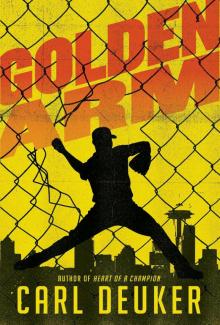 Golden Arm
Golden Arm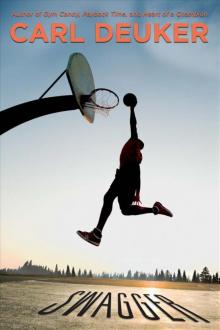 Swagger
Swagger Gym Candy
Gym Candy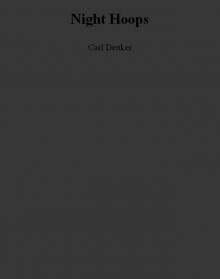 Night Hoops
Night Hoops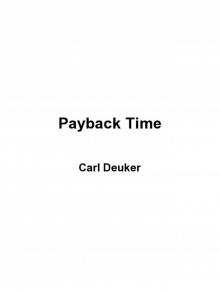 Payback Time
Payback Time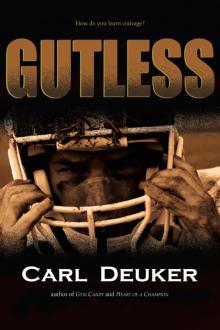 Gutless
Gutless Runner
Runner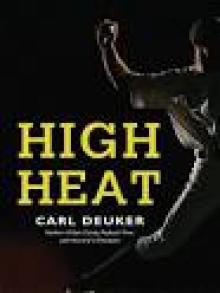 High Heat
High Heat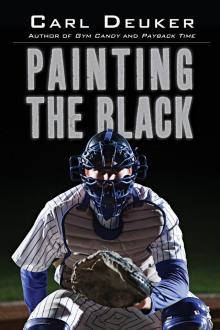 Painting the Black
Painting the Black